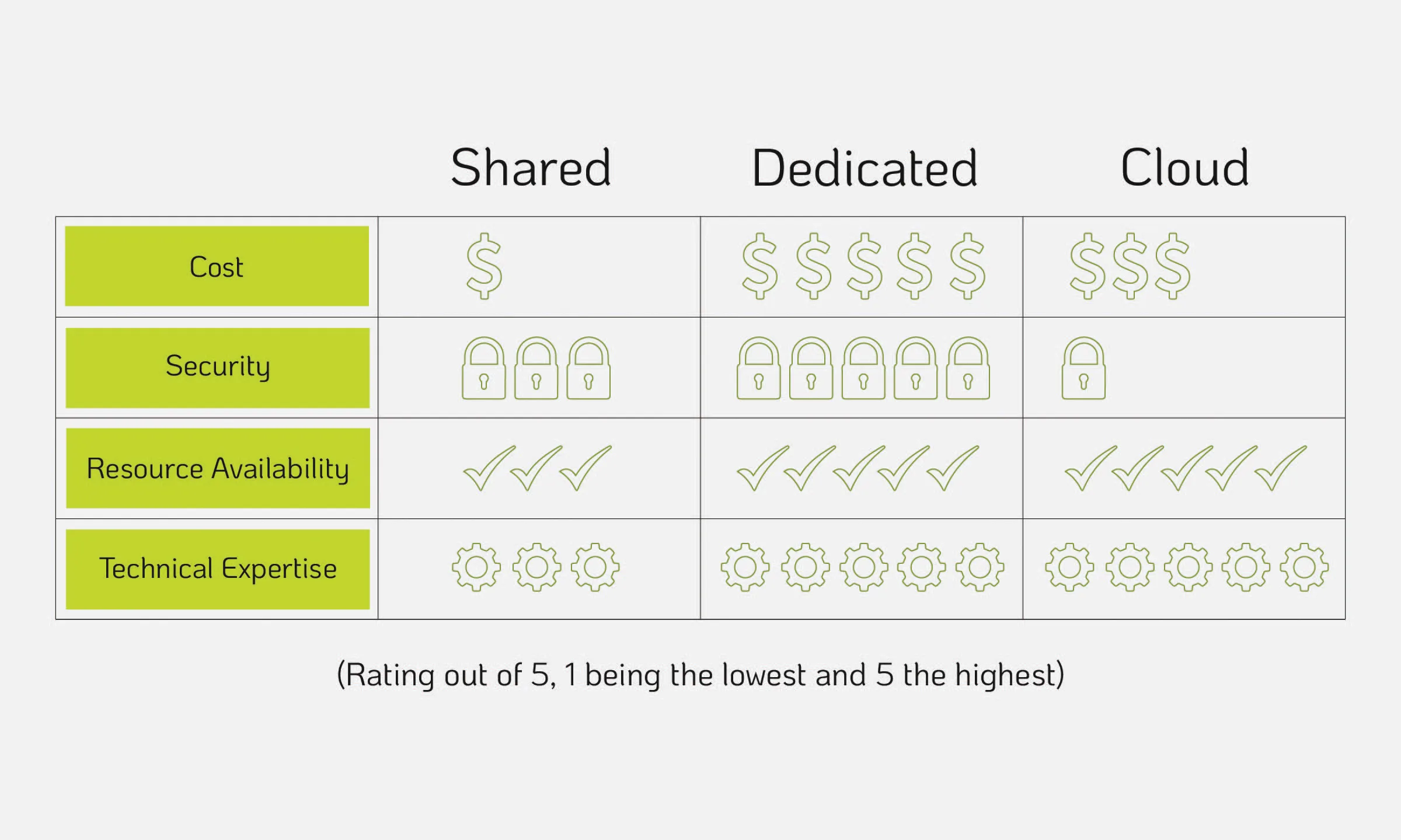Shared vs. Dedicated vs. Cloud Hosting: Which is Right for You?
- Hosting & Maintenance
- Web Development

Interested in learning more about the different types of hosting methods because you are ready to launch a new site, or make upgrades to your existing one? Maybe your site is, more often than you would like, creating problems for your organization, and you don’t quite understand how to fix them.
This blog will take a high-level overview of the key differences between shared vs. dedicated vs. cloud hosting. We will dive into the pros and cons of dedicated hosting, shared hosting, and cloud hosting.
Before we get into all that you may ask yourself, what is shared hosting? Or cloud hosting? Or dedicated hosting? And why may one be better for my organization? Don’t worry, we will cover that too.
Factors to Consider
Before you decipher through the different hosting options, ask yourself the following questions:
How many visitors come to my site monthly? The amount of traffic coming to your site helps determine the number of resources you need to run a successful site. If you have a smaller amount of traffic, shared hosting probably has enough resources.
What is your budget? With each hosting service, there will be differing costs based on whether you have a single server just for you or share a server with other organizations. There is also an option to pay an additional fee for managed hosting, which is like AAA Car insurance but for your website.
What are your website needs? Consider what your website’s purposes are. Users could be coming to your site to read blogs, get information, make payments, purchase a product or service, or fill out a form and request more information about your company.
What is Shared Hosting?
The main difference between shared vs dedicated hosting is the allocation of resources. In shared hosting, you “share” resources of one server with multiple companies. You’ll often see this referred to as “multi-tenant hosting.” This type of hosting benefits small businesses with low traffic, blogs, and personal websites.
Think of shared hosting as living in an apartment building. The building itself is shared by multiple people, and you may hear your neighbors through the walls or experience power outages all at once, but you are in your own space.
Advantages
Since you are sharing your resources, this type of hosting is the most economical. Also, since you do not own the server, there’s usually a web hosting company that can help you when there are issues with your website. This will depend on whether you decide to pursue managed vs unmanaged hosting, which is explained later in this blog.
Another benefit of shared hosting is simplicity. You’re not expected to manage the server yourself and many tools are often available to get your site up and running quickly. You’ll not require a dedicated person to operate and maintain the web server.
For smaller businesses that feel they don’t need a ton of resources to run a successful website, shared hosting may be your best option. This allows you to save some money and still get enough assets required for your site.
Disadvantages
While shared hosting does provide an economical solution, it isn’t without some drawbacks. Because shared hosting relies on a shared pool of resources, one site could affect other sites on the server. This could range from slow performance to being impacted by server crashes due to resource exhaustion.
If you become a repeat offender, you may end up in violation of a Terms of Service clause and may be evicted from the platform.
The simplicity of shared hosting may not be best for those who need something more complex. For example, if your website requires special software to be installed, your hosting provider may not be able to comply.
A special software could include an older version of PHP that is necessary for your site to run. In this case, because older versions of PHP may no longer be supported, your hosting provider may refuse your request, and you’d be unable to run the code that would need that version of PHP.
Just like living in an apartment building, sometimes a problem arises that affects the whole building. For example, a pipe bursts and floods a floor. The same applies to shared hosting. Sometimes your website may be impacted by an issue from another website on the same server.

What is Dedicated Hosting?
This type of hosting dedicates a server to a single business customer, meaning you have the most control of your physical hosting resources. Since all the resources are allocated to your server, and you have full control, dedicated hosting is the most expensive option.
If your website brings in high levels of traffic (300,000 or more page views monthly), and you’ll need all the resources, you may consider spending the extra money to provide dedicated hosting to your company.
Also, if you’re looking to build an e-commerce site where users need to make payments, dedicated hosting is the most secure option. Since credit card and personal information will be inputted into these types of sites, a more secure hosting option would be best.
Advantages
When comparing dedicated vs shared hosting, dedicated hosting allows you to have the most resources as well as the most control. You will not compete with other websites on your server for resources, since the server is strictly for you.
As your resources are only yours, so are your issues. With other hosting options, you have the potential to be affected by other websites’ problems. Dedicated hosting keeps everything isolated, so this not only makes your website more secure, but it keeps your website performing smoothly.
Disadvantages
Although having all the resources for yourself can be a dedicated hosting benefit, it may be the most expensive option. Additionally, dedicated hosting requires very skilled and technical management. Maintaining a server is an art unto itself and ensuring reliable and stable operation requires specialized knowledge and training.
VPS Hosting
VPS (Virtual Private Server) hosting is a hybrid solution between shared hosting and dedicated hosting. It has a similar foundation to shared hosting, but the resources are specifically allocated to you. Because of this, VPS hosting is arguably the most popular type of hosting.
Advantages
This type of hosting runs on its own operating system and offers flexibility and a high level of performance. Having a VPS will give you full control of your allocated resources and what you want to do on the server. For many, a VPS may be the solution for cost and benefit.
Disadvantages
Since VPS is a blend of the best of both worlds, it may have those same drawbacks, but to a lesser degree. For example, a VPS may require technical expertise, as you may need to manage the server instance yourself, but you won’t have to worry as much about hardware issues.
Similar to shared hosting, you still have issues with rowdy neighbors, as hosting providers will frequently have many VPS instances sharing a server. This is comparable to living in a city, you have your own space, but you’ll still be able to hear what your neighbors are doing from time to time.
What is Cloud Hosting?
A completely virtual hosting service, cloud hosting uses distributed computing resources. You’ll often see this referred to as PaaS (Platform-as-a-service), SaaS (Software-as-a-Service), or IaaS (Infrastructure-as-a-service). With the ability to move between regions relatively easily and quickly, cloud hosting is an effective solution for servers that need to be elastic and resilient.
Advantages
Cloud hosting allows you to pick and choose services you need without having to deal with resources that aren’t relevant to your needs. Your cloud vendor may also provide the means of easily scaling your resource needs on demand.
A good scenario would be planning for a surge in traffic and employing load-balancers to manage traffic load, spinning up additional servers to cover the surge, and then decommissioning those resources when the surge has subsided. Many times, a hosting company will partner with a Cloud Hosting provider to provide a solution for end-users.
Disadvantages
While cloud hosting has a lot of technological benefits, it can also be very complex and very costly. Many cloud services operate on an “à la carte” style price model, where your bill is based on the number of resources you use.
This structure may be affordable for low-resource sites, but you need to be aware of your usage so you don’t end up with a massive bill at the end of your term. It’s not uncommon to hear of a story where a company ran up a several thousand dollar invoice on Amazon Web Service because of some technical issue.
In the same vein as the high-tech aspect of cloud hosting, setting up a site on a cloud hosting platform can be complex and may require more professional knowledge. In some cases, cloud hosting providers take a hands-off approach to your server and will only cover support for the infrastructure surrounding it, leaving you to fend for yourself if an issue occurs.

Unmanaged vs. Managed Hosting
Now that we’ve determined the differences between shared vs. dedicated vs. cloud hosting, you have to decide whether your company will benefit from unmanaged or managed hosting. When comparing unmanaged vs managed hosting, consider the ability and goals of your organization.
Managed hosting means paying extra but gaining support services. So, when your site goes down, or you run out of resources, you won’t have to worry about how to fix it. You’ll simply call your web development team to help you out. With unmanaged hosting, you’ll be tasked with performing these issues yourself with minimal support from your vendor.
Managed hosting allows you to focus on your organizational goals and achievements rather than the technical management of your website. Here are some services that could be included in your managed hosting.
- Automated Backups
- Performance Monitoring
- Malware Scanning and Removal
- Hardware and Software Maintenance
Partnering with a Web Hosting Service
Once you compare shared vs cloud vs dedicated hosting and decide what’s best for you, your next step will be partnering with a web hosting service. Investing in a group of web developers and a marketing agency can help you focus on your organization’s success, with the assurance your site is taken care of.
At Tower Marketing, you have the opportunity to work with a full-service, innovative marketing agency with real people on the other side of the phone. Our development team works with WPEngine as a hosting solution provider for the majority of our WordPress clients.
Our developers also have the flexibility to utilize AWS (Amazon Web Services) for clients that require cloud computing solutions and use Linode and Digital Ocean for clients that need non-WordPress solutions.
Allow your organization to focus on what matters – your growth, your goals, and your future. Contact us today to learn more about our managed hosting and maintenance services.
 By Tim
By Tim  Kimmick
Kimmick